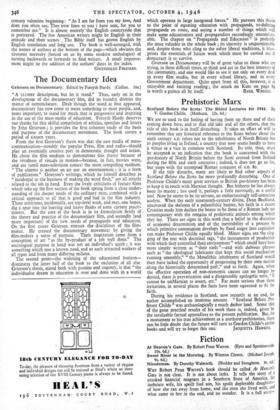Fiction
WHY Robert Penn Warren's book should be called At Heaven'! Gate is not clear. It is not about larks. It tells the story of a crooked financial magnate in a Southern State of America, his inebriate wife, his spoilt fool son, his spoilt deplorable daughter— of how she ran away from home, and the men she lived with, and what came to her in the end, and no wonder. It is a full story- but besides all this Mr. Warren has introduced a parallel story in the vigorous narration of a rustic evangelist, speaking a broad, blunt dialect, which the English reader may find difficult at first, but will certainly accept with delight as he grows accustomed to it. These two stories alternate chapter by chapter, and eventually grow together as parts of the same narrative. In the end, it must be admitted, the preacher's story proves not quite as relevant to the whole as the reader would have wished—but the alternation of themes is never once an irritation. The two stories unfold them- selves perfectly fairly, entirely logically : there is no trick, no mystery about it.
Now the author of Sweet River in the Morning has also employed the device of a double narration ; but whereas . Mr. Warren's plan is plain and simple, Mr. Clewes's is extremely complex. Charlie at, the age of seventeen commits his first burglary. As he moves quietly about the empty house, memories come to his mind, creating for the reader scenes from the story of Charlie's troubled life. But this covers only half of the author's plan. As Charlie passes through the rooms and up the dark staircases he, in some way, becomes aware of the story that has been lived within its walls during the last hundred years—and thus the reader is presented not only with a set of scenes about the early life of Charlie, but also with a set of scenes about the family of Gladstone, jam-manufacturers, owners of the factory where Charlie works ; and both are stories of violence.
It is an ingenious way of making a novel. The criticism is that it is too ingenious, for what the author gains in ingenuity he loses in authenticity. Charlie's story as remembered by himself is ex- cellent. It is markedly in the style of Liza of Lambeth, but it has a strength of its own. The second story, though equally well told, is unacceptable in comparison with the first. The fantasy fights with the realism; and the reader resents the spooks cutting across a story which was already good without them. Besides they tempt Mr. Clewes to sin against logic. How could Charlie come to know scenes that happened long ago outside the house, away down by the river?
There can be no doubt that Winston Clewes makes a just claim in this book to be considered a novelist of distinction. His dialogue is faultless ; his characters clear ; his style disciplined. But Sweet River in the Morning is too much of a jig-saw puzzle. The two stories (for they run in parallels rather than coincide) are scattered through the book in pieces which the reader must collect and put together. And this is rather too large an exercise. The bits do not always fit with precision, and the bitty-ness makes difficult read- ing. Which is why the reader remembers with most pleasure the largest of the bits, a description of •the firm's annual outing.
Dorothy Walworth's Nicodemus is not so much a book of parallel stories as a book of parallel studies. It begins at the Easter service in the church of St. Simon's, Fifth Avenue, New York. In the crowded congregation is Laura, who is bored to death by her husband's self-important friends ; Nick, an- actor who has come there for copy ; and Gladys, who works in the subway, and is seek- ing religion for the first time. In the pulpit is Dr. Tatum—and he has lost his faith. Turn by turn the reader inspects these four people until the Christmas service comes round, by which time all have been tested by experience.
This is a curious book, because it is at once readable and pre- tentious. Part holds the mind ; part repulses it. Analysing further, one finds the scenes of action good ; the pages of recorded thought less good—for introspection is never very entertaining to the eavesdropper. Gladys, who doesn't know the meaning of the word, comes out of this trial with unruffled charm—but Dr. Tatum, Nick and Laura have their tedious moments. That there are not more tedious moments is due to the author's discretion. She may irritate the reader with some pages from the records of an unim- portant Soul ; but she gets him again, and with flashes of pure sentiment neatly balanced by flashes of pure' humour.
Gladys learns on Christmas morning that her soldier has been. killed. She goes to church and there she sees him " in his battle uniform, helmet and all, and he had a sort of light about him, and the strange part of it was that he had_three children with him, and they looked as if they were waiting for her, too." It takes the reader unawares, but on the next page (to ease the gulping throat) there is Miss Grooby. "The soprano was singing her solo, ` I Know That My Redeemer Liveth.' . . . There was Miss Grooby, as usual, in the front row. Miss Grooby had predicted that God would strike the soprano dead in the middle of her solo, on account of her asking for more pay. But the soprano kept 01? singing." Nicodemus is an uneven book, but it is often amusing and it is written with sincerity. V. C. CLINTON—BADDELEY.































 Previous page
Previous page